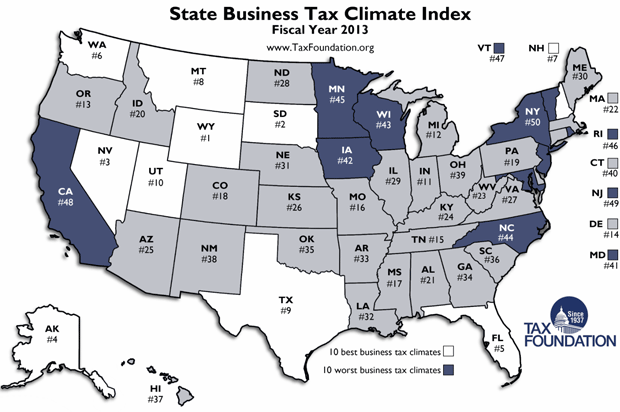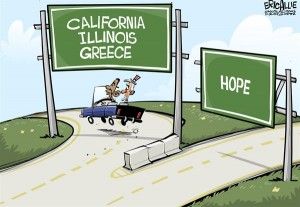CA leaders still attacking businesses, jobs
March 11, 2013
By Katy Grimes
While I am an eternal optimist, it is impossible to ignore that California is bleeding jobs. I am also a realist.
Unfortunately for the Golden State, California’s leaders and lawmakers continue to ignore the facts, and instead continue to push through the same failed policies of higher taxes, more fees, and more regulations — continually expanding the size of government.
According to the Wall Street Journal, California lost 150,000 residents to Texas in just the past five years. “In the same time span, Texas gained 400,000 jobs while California lost about 640,000.”
California is 24/7 Wall St.’s “Worst Run State” for the second year in a row. “Due to high levels of debt, the state’s S&P credit rating is the worst of all states, while its Moody’s credit rating is the second-worst,” 24/7 Wall St. reported.
Even the Bureau of Labor Statistics reported Texas was responsible for 47 percent of national net job creation in 2012.
The Tax Foundation weighed in as well. “While Governor Brown contends that the income tax increase is necessary to prevent cuts to popular government services, the historical record shows that California’s budget has grown steadily in recent years,” said Tax Foundation economist Scott Drenkard. “Additionally, the plan’s heavier reliance on high income earners will only further exacerbate California’s troubles with revenue volatility, impacting the state’s ability to fund future government programs.”
Despite media fawning over Brown, he may go down in history as the governor responsible for bringing the Golden State down to its knees.

Chief Executive Magazine recently named California the worst state for business in the entire country, for the eighth year in a row. “State politicians feel business and commerce are ‘necessary evils,’ that provide the funds to enable pursuit of their misguided agendas,” said one executive.
“Any move to raise taxes on the rich — defined as households making over $250,000 annually — strikes directly at the economies of these states, which depend heavily on the earnings of high-income professionals, entrepreneurs and technical workers,” journalist, demographer and California analyst Joel Kotkin said in Forbes. “In fact, when you examine which states, and metropolitan areas, have the highest concentrations of such people, it turns out they are overwhelmingly located in the bluest states and regions.”
The following are comments from some of the participating CEOs in the Chief Executive magazine survey:
* “California is the worst! They are doing everything possible to drive a business out of their state. If it were not for the climate, they would have lost half their population.”
* “California regulations, taxes and costs will leave only tech, life sciences and entertainment as viable. If you aren’t an elitist, no room here for the middle or working classes.”
* “California treats business owners like criminals. California has different overtime policies for its own employees vs. private sector.”
* “California’s labor regulation is a job killer. We will be moving our business out of the state, which will lose hundreds of jobs simply due to the poor regulatory environment.”
* “California should secede from the union—it is like doing business in a foreign country, it has its own exchange rate, and its regulation is crazy.”
Cash Cows
“Although Gov. Jerry Brown deserves credit for some spending cuts, his proposed budget promises more out-of-control spending financed with higher personal income taxes,” Chief Executive Magazine said. “It’s little wonder that most Silicon Valley CEOs say they won’t expand in California because of high taxes and burdensome regulation. Intel long ago moved its plants to Nevada, and Cisco, Google and others have relocated their server farms to places like Utah, Arizona and Oregon. California still ranks first in technology, agriculture and entertainment, but even this advantage in time can be undermined.”
But remember Gov. Brown thinks new taxes are the way to improve the state’s standing, and are even biblical. As he said in this year’s State of the State address:
“Recall the story of Genesis and Pharaoh’s dream of seven cows, fat-fleshed and well-favored, which came out of the river, followed by seven other cows, lean-fleshed and ill flavored. Then the lean cows ate up the fat cows. The Pharaoh could not interpret his dream until Joseph explained to him that the seven fat cows were seven years of great plenty and the seven lean cows were seven years of famine that would immediately follow. The Pharaoh took the advice of Joseph and stored up great quantities of grain during the years of plenty. When famine came, Egypt was ready. The people have given us seven years of extra taxes. Let us follow the wisdom of Joseph, pay down our debts and store up reserves against the leaner times that will surely come.”
It’s just a shame Brown focused on the seven years of extra taxes instead of paying down our debt. And it’s painfully clear when Brown talks about biblical cows, he thinking of the rich in California as cash cows.
California even made it onto the list of worst states in which to get sued. “Los Angeles courts ranked second-worst in the nation for fairness, and San Francisco‘s came in fourth,” Forbes Magazine reported. “Plaintiffs’ lawyers bring cases in California because the state’s courts rubber-stamp class actions and juries award out-sized paydays,” says ILR’s Rickard.
The state is considered one of the most-regulated for business, and more laws mean the opportunity for more lawsuits. The state’s ranking has been sinking steadily over the past decade, while neighboring states Oregon and Nevada have won higher rankings for improving their courts.
California’s sucking sound
“The sucking sound continues as frustrated businesses leave state for friendlier climes,” Chief Executive magazine said.
“The people whose wallets will be drained in the new war on ‘the rich’ are high-earning, but hardly plutocratic professionals like engineers, doctors, lawyers, small business owners and the like,” Kotkin said. “Once seen as the bastion of the middle class, and exemplars of upward mobility, these people are emerging as the modern day ‘kulaks,’ the affluent peasants ruthlessly targeted by Stalin in the early 1930s.”
Kotkin added: “The ironic geography of the Democratic drive can be seen most clearly by examining the distribution of the classes now targeted by the coming purge.”
But this purge could take a while, with public employee unions in bed with the Legislature.
Are we doomed? The optimist in me says we’ll pull out of this. But the realist says California won’t turn around until everyone is financially hurting enough to throw out the ruling political party.
Related Articles
Court backs cities on prevailing wage
July 6, 2012 By Joseph Perkins The California Supreme Court ruled this week that the state’s prevailing wage law does
Good, bad and ugly initiatives
Jan. 5, 2010: Any reform that will actually help fix the ongoing California government’s fiscal mess (serious spending limits, pension




